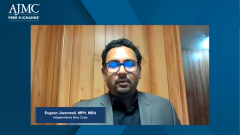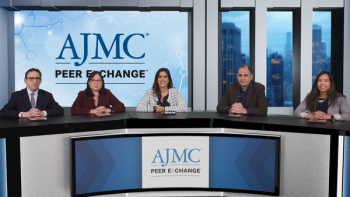
Information Provided by Comprehensive Genomic Profiling Assays
Information that can be extracted from results of comprehensive genomic profiling assays and used to guide treatment decisions in oncology.
Episodes in this series

Bruce Feinberg, DO: Kenna, when we start thinking about the depth and breadth of what’s involved, as we start to think about precision as it applies to cancer, there seems to be a belief or a desire that when we do comprehensive genetic profiling, 1 test gives us all the answers. Is it a test that gives us all the information? Or is it a test that begets more tests? Historically, that’s been this problem: We want a new test, but the test doesn’t solve; it just makes more tests. We think about hormonal-based targeting as a form of precision. Looking at PD-L1 and where we’re going to look for PD-L1 in the tumor cell—in the lymphocyte—which of these stay high? Is the definition around a companion diagnostic? Is the companion diagnostic something we can extract? As Mark said, everything is coming from the genome. Can we extract that information from that test? That’s where a lot of the questions and concerns come in, and that adds to greater complexity. I got this test, but not only does it potentially not answer all my questions, but all the answers it gives me confuse me. They don’t help me.
Kenna R. Mills Shaw, PhD: Sure.
Bruce Feinberg, DO: There’s a lot going on there. Let’s start with that piece. What can comprehensive genetic profiling do? What can it not do?
Kenna R. Mills Shaw, PhD: Even if I have a predictive biomarker, there’s an answer on a test that suggests that a patient is likely to respond. Prediction in an NGS [next-generation sequencing] assay, unfortunately, doesn’t lead to certainty. Those 2 concepts—precision and certainty—aren’t the same thing in this context. I can’t always be 100% sure that even the patient with the right diagnosis, with the right biomarker and a level 1 indication—whether it was on a companion diagnostic or not—is going to respond robustly to a specific treatment. I should also say that I’m not a real doctor. I’m a PhD, but I don’t practice medicine.
Bruce Feinberg, DO: My wife is a PhD and she calls me a band-aid doctor. She’s the real doctor.
Kenna R. Mills Shaw, PhD: There you go.
Bruce Feinberg, DO: You have people in your camp.
Kenna R. Mills Shaw, PhD: For us, this concept doesn’t necessarily lead to more tests, but it gives us a direction to pursue. The other concept that’s important is that it absolutely doesn’t tell us everything. Even if I was going to do a whole genome sequence, many of the comprehensive genomic profiles that we’re talking about are only on the order of a couple of hundred genes, 500 to 600 genes maximum. Even when I have these assays that were on whole exomes, I often don’t find the magic bullet, from not just a therapeutic perspective but also a causal perspective. I don’t always see the magic bullet that’s clearly driving this tumor. In fact, in 40% to 50% percent of tumors, they look completely clean or cold, some people say, on these CGP [comprehensive genomic profiling] assays. That’s not to say that there’s not a genetic driver, but the assay isn’t capturing it. Only in half of our patients are we going to see that magic bullet that gives us a hint of a therapeutic option for our patients. It’s important to make sure we’re going into a genetic test with our eyes wide open for what we should realistically expect. That’s true for our clinicians as well as our patients and our payers. If a test is ordered and approved, sometimes no answer is also important. It hopefully prevents us from using drugs that aren’t likely to be useful in a specific patient.
Transcript edited for clarity.
Newsletter
Stay ahead of policy, cost, and value—subscribe to AJMC for expert insights at the intersection of clinical care and health economics.









